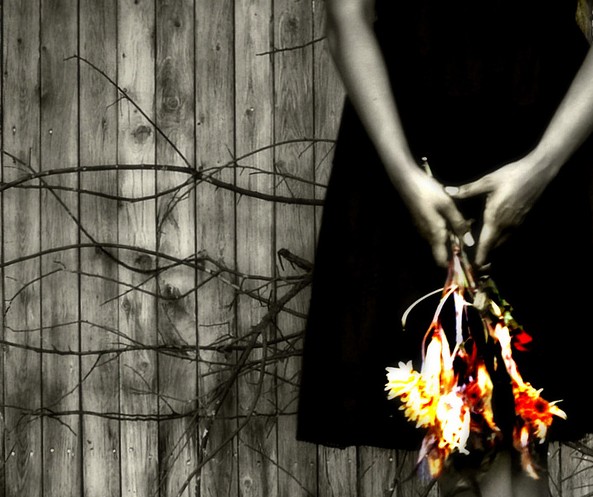
The ability to forgive is a sign of true compassion.
Forgiveness is one of the most beautiful qualities of the human spirit. The action of forgiveness heals us emotionally, resolves pain and liberates us from old regret, anger, and grief.
Once we have fully forgiven someone, a weight lifts from our shoulders and sets our hearts free.
Understanding these benefits of forgiveness sometimes compels us to move through the motion before we’re really ready to forgive. This is what I call premature forgiveness, which is rooted in fear rather than love.
I have traversed the terrain of premature forgiveness one too many times. I have done it with friends, family and ex-boyfriends. The good girl in me forgave quickly, easily, and with a generous smile, bypassing that little voice that was telling me to slow down, take my time, and feel the impact of what had happened. As a result of my fears, I let people back into my life a little too quickly, and I robbed myself of the valuable lessons life was offering me—that there is wisdom in my hurt and anger.
The Root Fears of Premature Forgiveness
- Fear of uncomfortable feelings (anger, hurt, sadness, etc.) that I am experiencing as a result of keeping a distance from you.
- Fear of uncomfortable feelings that you or others might have as a result of this barrier.
- Fear of the unknown, as illustrated in questions like: “What is our new relationship now? What will happen if I run into you? What will others think if we don’t heal this right away?”
When fear arises, we often have the urge to quickly bypass it in order to move towards more “enlightened” feelings such as forgiveness, empathy, and compassion. Don’t get me wrong—these are remarkably courageous and important feelings. But sometimes in our rush towards being “enlightened” or “compassionate,” we forget to check in with ourselves. It’s important to figure out whether we are actually ready to come to a resolution or are using these feelings to escape uncomfortable ones.
The Wisdom of Waiting
If true forgiveness hasn’t arrived, it’s usually for a reason. Perhaps there is still some anger or pain to be excavated. This pain should be acknowledged and respected—it wants to know that we are taking steps to surround ourselves with those who truly honor, respect, and care for us. Our anger holds great wisdom. She (Yes, I like to call anger a “she”…think Kali) arises to let us know that a boundary has been crossed. Anger is our inner protector who craves our acknowledgement of the ruptured boundary.
She is there to push us to take appropriate action to restore what has been broken.
If we can be present with our pain and anger, the subtle tendrils of true forgiveness may begin to sprout.
The trick is to not judge the process, but instead trust in the wisdom of it.
For me, true forgiveness is always on the table, regardless of what has happened between myself and another person. I never lose sight of my ultimate desire to forgive—but this doesn’t mean that I am guaranteed to arrive at forgiveness. There are no guarantees when it comes to matters of the heart. But it does mean that even in the searing heat and hurt of my current emotions, I never fully lose myself to the blind righteousness and adrenalized perfumes of the ego (well, almost never). Instead, by consistently keeping the door open to forgiveness, I can sit with these heated feelings without losing myself to them.
On several occasions—and much to my surprise—the only thing keeping me from truly forgiving someone else has been my reluctance to fully face and forgive myself. In my experience, inner forgiveness occurs when we can honestly shine the light of our compassionate awareness on something we’ve previously deemed unworthy of such love.
Forgiveness as a Journey
My own relationship with forgiveness has humbled me to my core. It has taught me so much about patience and reminded me that there is never one perfect path for healing. I have also learned that to forgive someone is not the same thing as condoning their actions or behavior, nor is it necessarily an invitation to welcome them back into my life.
On the forgiveness journey, we may experience waves of compassion right beside waves of anger or sadness. Sometimes, when I begin to feel forgiveness, I think I have finally arrived at some desired destination, only to find that I still have anger or hurt left to feel. Sometimes I find myself judging these moments, thinking, “I should be done with this!”
But alas, I am not. I am a human with a wise and complex heart.
Through my personal journey with forgiveness, I have developed a simple process to see when we are prematurely forgiving someone. By taking the time to move through these steps, we can move that much closer to true healing.
1. Slow it Down.
When something hurtful occurs between you and another person, notice the impulse to forgive as a way to quickly bypass uncomfortable feelings. This is premature forgiveness and it will not ultimately serve you or your relationship.
2. Be and Breathe with the Discomfort.
Try breathing with your hurt and anger. Get out a journal and interview your feelings. If your pain or anger could speak what would they say? Ask these feelings, “What boundary was crossed? What needs to happen to restore what has been violated?”
3. True Forgiveness is on the Table.
Let true forgiveness guide the way by saying, “If I am honest with myself, I may not fully forgive this person yet, but I am ultimately willing to forgive them.” Your willingness opens the door to greater healing, supporting you in not getting overly fused with your anger or pain.
4. Forgive Yourself.
Life has a funny way of illuminating in others what we most need to face and forgive in ourselves. Try asking yourself, “Is there anything I need to see or face within myself? Am I willing to forgive myself for these things?”
The journey of true forgiveness is a courageous path. It requires that we compassionately turn towards our discomfort, breathing light into its darkest corners, and trusting the wisdom of our discerning heart.
Author: Juna Mustad
Editor: Renée Picard
Photo: laura betancourt/Flickr






Read 1 comment and reply